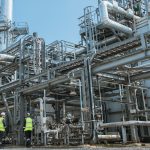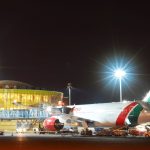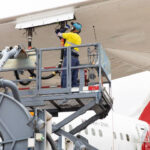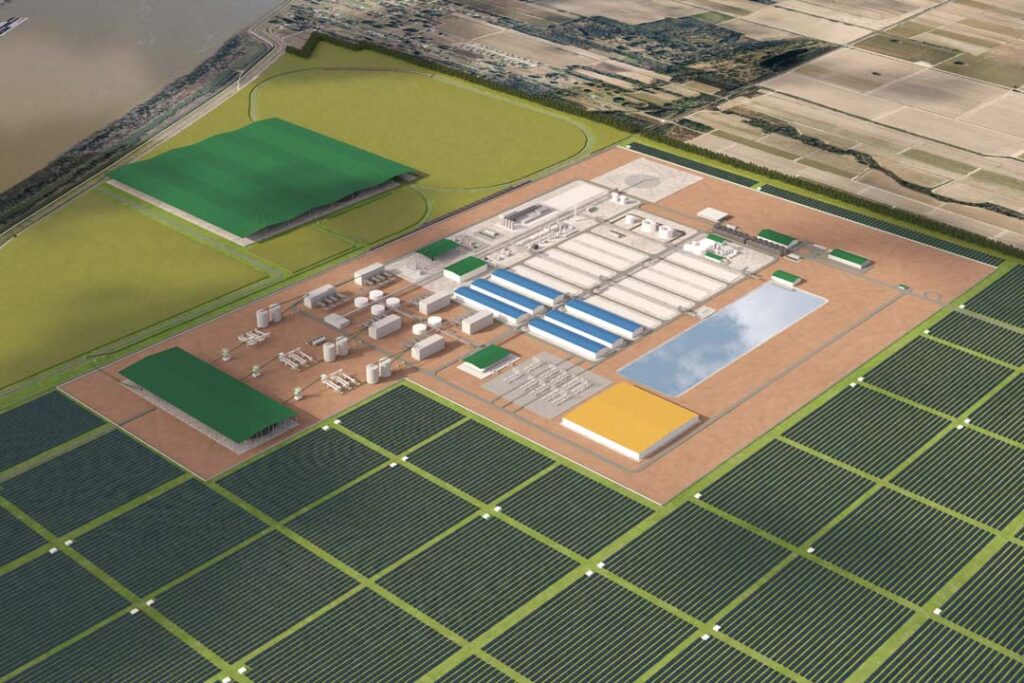US sustainable aviation fuel production startup DG Fuels has selected Fischer-Tropsch (FT) technology co-developed by Johnson Matthey and energy giant bp for its proposed $4 billion SAF plant near the Mississippi River in Louisiana. Subject to approval being received this year, the St. James Parish facility could be in operation by 2028 and would be the largest announced FT SAF production operation in the world, says DG Fuels, with a planned capacity of 13,000 barrels per day, or around 120-135 million gallons of SAF annually. The FT CANS technology is feedstock agnostic although the facility will use plant waste, primarily sugar cane bagasse. Meanwhile, Southwest Airlines has acquired SAFFiRE Renewables, which is utilising technology developed at the Department of Energy’s National Renewable Energy Laboratory to convert corn stover, a widely available agricultural residue feedstock in the US, into renewable ethanol. SAFFiRE is now expected to proceed with developing a pilot plant in Kansas to produce ethanol for conversion into SAF by LanzaJet.
Commenting on its collaboration with Johnson Matthey and bp, DG Fuels’ CEO Michael Darcy said: “Using their co-developed FT CANS technology allows DG Fuels to scale SAF at high volume production and competitive prices for the first time ever. This innovation will take our SAF from the sugar cane fields of Louisiana to cleaner skies all across the world.”
DG Fuels has already secured offtake purchase deals with Delta Air Lines and Air France-KLM, and has a strategic partnership with Airbus to scale up the use of SAF globally. Last November, Air France announced it was investing $4.7 million in the company and the Air France-KLM group acquired an option to purchase up to 25 million gallons (75,000 tons) of SAF annually over a multi-year period beginning in 2029 from the Louisiana plant and a second facility planned in Maine. This is on top of a 2022 offtake agreement by the group for 600,000 tons of SAF from DG Fuels, to be delivered over ten years.
For its first project, the company has earmarked a 3,000-acre (1,200ha) site on the West Bank of St. James Parish for potential development of the near $4bn facility. It says the project is anticipated to create 650 direct permanent jobs, with preference given to local residents and promises to address local needs while protecting the environment and promoting economic prosperity in the area.
To help secure local support for the project, DG Fuels says it has engaged with community members and local government officials to draft a legally binding Community Benefits Agreement that would provide $26 million in funding towards a community centre, a health clinic, paid internships and other benefits. The CBA received support from the St. James Parish Council in February.
The company expects to purchase $120 million of sugar cane waste from local farmers, with nearly one third of this directly benefiting farmers in St. James Parish. This provides an environmentally-friendly and financially attractive alternative to practices where farmers burn the sugar cane trash after harvesting, it adds.
“Our clean facility will have fewer air emissions than a standard US hospital, will have no impact on the Mississippi River and will help to heal our planet,” says the company. “Our fuel made from sugar cane and plant waste is clean, sustainable and created with renewable energy.”
The FT CANS technology converts synthesis gas created in the DG Fuels’ proprietary production process to synthetic crude for further processing into SAF. FT CANS is being used by Fulcrum BioEnergy to convert municipal solid waste into SAF at its Sierra plant.
“Our FT CANS technology solution brings together decades of science and engineering expertise from bp and Johnson Matthey, and this project shows its competitiveness across a range of production scales and feedstock sources the industry needs,” said Noemie Turner, VP Technology Development & Commercialisation at bp. “We’re excited to see the relationship with DG Fuels grow, and we look forward to seeing this project come to fruition.”
Added Christopher Chaput, President of DG Fuels: “With this technology, we will create a product that is responsibly made and can be immediately substituted for conventional aviation fuel with no engine adaptations. This partnership is a significant boost to help the aviation industry reach its climate goals.”
SAFFiRE acquisition
Southwest Airlines first invested in SAFFiRE Renewables during the first phase of the ethanol producer’s pilot project in 2022 and through its newly-launched Southwest Airlines Renewable Ventures (SARV) subsidiary, the airline has now moved to acquire the company. As a result, SAFFiRE is expected to proceed with phase two by developing a pilot plant hosted at Conestoga’s Arkalon Energy ethanol facility in Liberal, Kansas.
“This acquisition marks Southwest’s transition from investor to sole owner of SAFFiRE, expressing our confidence in their technology and its potential to advance our sustainability goals, as well as the goals of the broader industry,” commented the airline’s CEO, Bob Jordan.
SAFFiRE is part of a project supported by the Department of Energy (DOE) to develop and produce scalable renewable ethanol. The Kansas plant will utilise SAFFiRE’s exclusive technology licence from NREL to process 10 tons of corn stover per day into ethanol, with a plan for the ethanol to be converted into SAF by LanzaJet’s alcohol-to-jet (ATJ) technology, which partly owes its development to the DOE’s Pacific Northwest National Lab. LanzaJet was added to the SARV portfolio in February when the airline announced a $30 million investment in the ATJ company.
Another agricultural residue, corn stover is the stalks, leaves and husks of corn plants that is largely left to decompose in the fields after the corn harvest each year. SAFFiRE plans for corn stover to be collected by custom harvesters or by local farmers and processed through a proprietary Deacetylation and Mechanical Refining (DMR) technology developed by NREL, called DMR pretreatment.
“Renewable ethanol is an important feedstock to realising high-volume, affordable SAF, which is a critical part of the journey to net zero emissions,” said Tom Nealon, President of SARV and CEO of SAFFiRE. “We are enthusiastic about the ethanol-to-SAF pathway and SAFFiRE’s potential ability to produce renewable ethanol at a scale that is economically viable.”
Image: Render of the proposed DG Fuels SAF facility on the banks of the Mississippi River in Louisiana















More News & Features
UK government starts new consultation on SAF revenue certainty mechanism
African Development Bank and Japanese industrialist unite to explore SAF production in Africa
LanzaJet and KMG agree to progress SAF production project in Kazakhstan
SkyNRG says e-SAF and carbon removals should not be competing strategies for aviation decarbonisation
South Korea announces mandatory SAF blending for departing international flights from 2027
Catagen launches SAF production company and signs offtakes with Ryanair and Shell